Thelma & Louise Pt. 5: Crossing Over
 Thursday, May 26, 2016 at 10:26PM
Thursday, May 26, 2016 at 10:26PM  25th Anniversary Five-Part Mini Series Event
25th Anniversary Five-Part Mini Series Event
Pt 1 (Anne Marie & Margaret)
Pt 2 (Nick Davis)
Pt 3 (Daniel Crooke)
Pt 4 (Nathaniel R)
Pt 5 (Finale) by Laurence Barber
It feels awfully daunting to write about the ending of this film, and not just because, as Nathaniel pointed out, ditching the cop who pulled them over isn’t Thelma or Louise’s finest hour. As an Australian who has experienced outback heat, that scene always makes me feel a bit nauseous even if the way their doing away with this discipline daddy is pretty amusing. More logically, they could have made use of his handcuffs to disable him instead, but you have to appreciate that Callie Khouri hasn’t constructed these crimes around what feels like pattern behaviour. Aside from Thelma’s charm assault/armed robbery, their transgressions feel genuinely like two women thinking on their feet.
Also, you catch a glimpse of a shotgun behind him as he trades shades with Louise so I’ve always believed he figured his way out somewhere down the line (shoot the lock, dummy!).
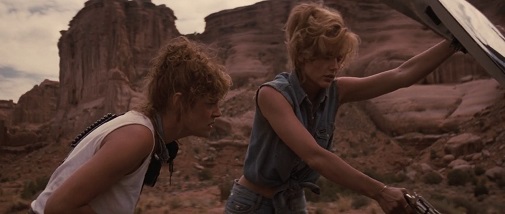
Thelma: Officer, I’m real sorry ‘bout this.”
Louise: I apologise also.”
1:40:00 This aspect of the scene has always spackled over my misgivings about it too. Much has been said and written in recent years about the way women over-apologise, exercising a kind of ingrained cultural deference to male authority. In this scene, however, their apologies become a subversion; the way Sarandon half-heartedly apologises tells us that she’s given up caring about the needs of men in any meaningful way.
Replete with her new Aviators – a hot new look Scott drinks in with a zoom that feels as awed by Sarandon as we do by this point – Louise and Thelma jump back in the Thunderbird and put rubber to the road, the final stage of their road trip stretching out before them. In a brief cut back to the police part of the plot, Harvey Keitel gravely intones, “Dreams will only get you so far, and luck always runs out.” Lighten up, toots...
1:41:03 Jeez, no matter what these ladies do they just can’t escape hypermasculine bullshit.
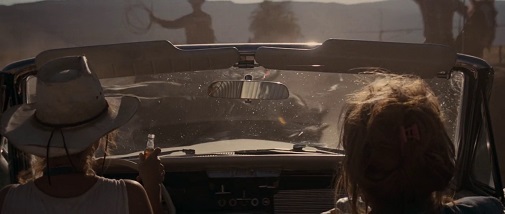
Louise, understandably, has yet another tiny bottle of booze in hand. Our two actresses are back in separate shots again as Louise ventures towards an apology for the mess she got them into, but Thelma reminds her that while what they’d done was bad, at least they had done it with agency. “They woulda made out like I’d asked for it. My life woulda been ruined a whole lot worse than it is now. At least now I’m having some fun.” Then she goes into this pose...
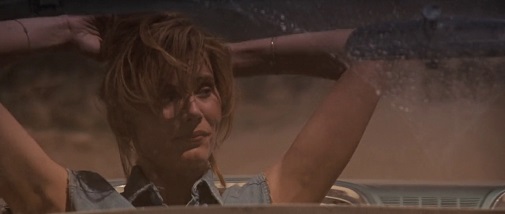
...which prompts a wonderful reaction from Louise:
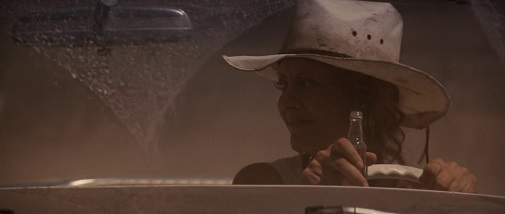 tfw you liberate ur crush from the heteropatriarchy
tfw you liberate ur crush from the heteropatriarchy
1:42:20 Here comes one of my very favourite scenes as Louise calls to talk to Slocumb. This is the scene which should have nabbed Keitel an Oscar nom that year. His gentle concern and fondness for Louise is so disarming when in anything other than a masterpiece he’d be some kind of alpha male Javert type trying to take them down by all means necessary. Yet another phone conversation rendered stunning by framing and performance as Thelma reacts to the conversation wordlessly in the background.
And then Slocumb mentions Texas and it’s like the final straw.
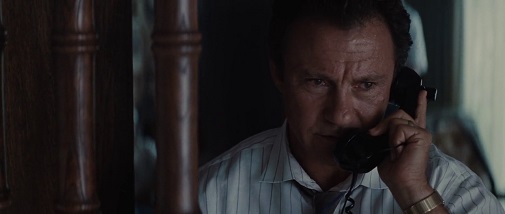
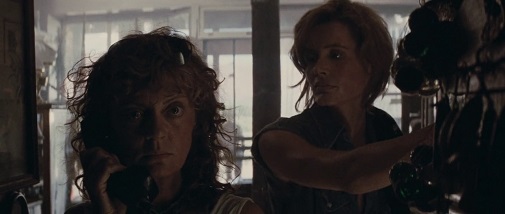
1:45:30 It’s wonderful how every time Thelma and Louise talk candidly about their predicament it becomes even more nuanced than before. Louise declares that she has nothing to go back for – “Jimmy’s not an option” – and Thelma decides, “Something’s like…crossed over in me and I can’t go back.” For those of us, myself included, who consider this at least fractionally a queer story, this is where it truly happens. Look at the way Davis steels herself for this admission:
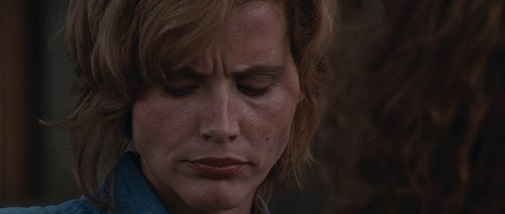
Louise then drops the news that they’re being charged with murder, and Thelma responds, “Ooh!” How wonderful is this movie? Thelma says she “feels awake”, and they chat about the future they know they don’t truly have in Mexico. You can read in their faces that they know what’s in store.
1:47:40 The old world…into the new.
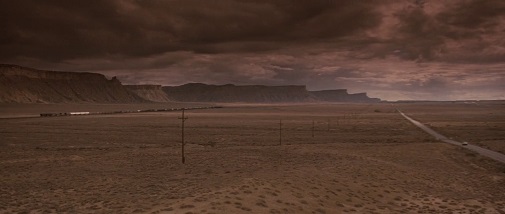
Another quick song break – “Better Not Look Down” by B.B. King – and the soundtrack continues its less-than-subtle streak.
Then, up ahead, looms the truck driver.
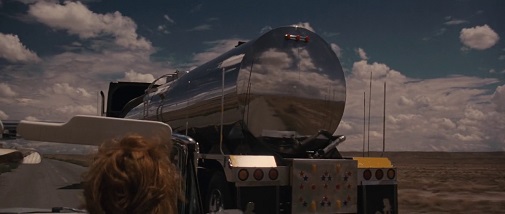
If Thelma & Louise were made in 2016, this guy would probably be a men’s rights activist. Instead he’s a coke dealer-looking nutjob who pulls off his wedding ring and kisses his condoms for, I guess, good luck. Is this wishing for good sex or intact prophylactics? So much unexplored psychology. He is garishly awful, even doing a quick jig when he jumps down from his rig. Even if these broader moments don’t work as well for you, you can’t say Scott and Biddle didn’t know how to shoot them.
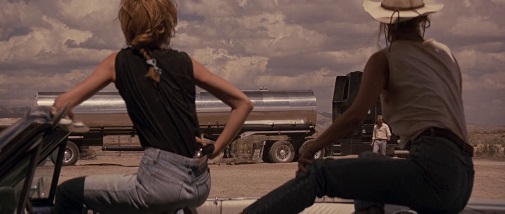
It’s full circle by this point. These avenging Charlie’s Angel poses are glorious, although I’m not sure how much I dig Thelma’s costume change. But then, given her newfound disposition and freedom, it seems fairly ironic to wear a Confederate flag.
1:51:53 Attention to detail: Thelma’s arm is still bruised.
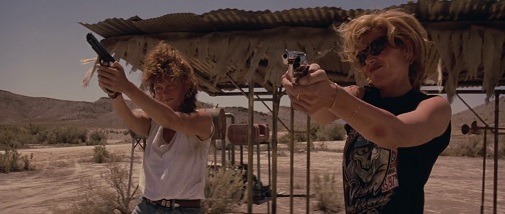
1:52:55 We quickly revisit the cop in the car to make sure he’s still alive, I guess. Unfortunately for him, the person who finds him turns out to be a cyclist smoking a big ol’ blunt. Not that the racial implications weren’t clear at the time, but this brief scene feels a bit less funny these days than it used to. We also briefly see Christopher McDonald looking anguished as we hear police radio list off Thelma and Louise’s crimes. It’s quite a list.
1:55:00 The first sighting of police cars. Louise asks, “Think that’s all?” Thelma replies, “I dunno, I don’t think so.” Good instinct. They veer off the road and the police cars follow; the famous chase begins. I had forgotten that they have to drive straight through a bunch of police cars. One flips, another slams into two others, and the Thunderbird knocks a side mirror off yet another as it soars gracefully in slow-motion.
A brief digression so I don’t just describe the entire car chase: my first introduction to Thelma & Louise was via The Simpsons’ episode “Marge on the Lam”, in which Marge and Ruth Powers go on an extended jaunt to escape the men in their lives.

It’s a great episode, and one of the uncommon Simpsons episodes that focuses purely on female friendship (at least in part because Lisa and Marge aren't exactly social butterflies). It’s also smart enough not to treat Thelma & Louise, timeless as it is, as a sacred cow. At one point Homer bemoans the fact that it seems like Marge and Ruth are going to drive into a massive chasm just to teach men a lesson. It’s a loving but needling homage.
1:57:35 This film does absolute wonders with these aerial shots, and this iconic image is no exception. It's strangely appealing that once the cars travel through the shot far enough it becomes harder to differentiate between the Thunderbird and the police cars. We’re all just human beings, man.

1:58:25 Here’s a cruel scene because for a second it feels like maybe that was the worst of it. A police car blocks the way after their convertible squeezes under a rail bridge and as they drive on they sit in silence and take stock.
“You’re a good friend.”
“You too, sweetie. The best.”
The relative calm is punctured when Zimmer’s score kicks in and the helicopter emerges, almost like a particularly annoying mosquito. You know it’s going to draw blood no matter how hard you try to squash it at this point.
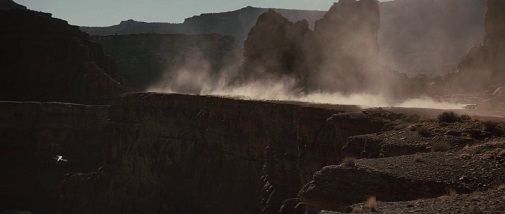
2:00:25 It’s really difficult to keep track of the geography at this point. You can sort of tell that they’re essentially driving where there are beautiful shots to be found. The cavalry arrives, and the Grand Canyon stretches out below them. They only get to appreciate its beauty for a moment because the arrival of helicopters and tanks and police cars destroys the serenity of mother Earth. It might be a bit undergraduate to note it, but the feminine symbolism of the canyon is hard to ignore.
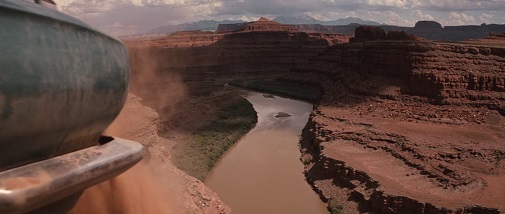
2:03:20 “Okay then, listen. Let’s not get caught.”
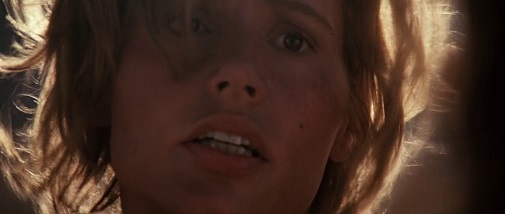
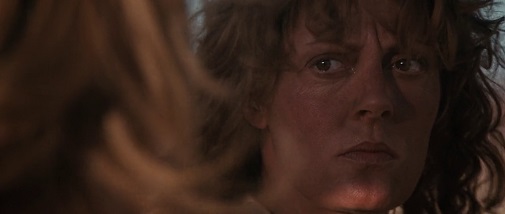
It’s truly testament to just how much this movie works that this scene, in which the two main characters agree to a spontaneous suicide pact, feels uplifting rather than horrifyingly bleak. At least some of that is the framing; they’re now essentially surrounded by what they’ve been trying desperately to escape. All they have is each other, because the rest of the world has never done anything for them. And then they kiss, without really having the time to unpack what that means for either of them. It’s just a pure expression of love; likely the purest either have ever felt for another person. You might say the way it's shot obscures the kiss itself maybe too deliberately, but at the same time, for the very first time in the movie it feels like we're intruding on a private moment between them.
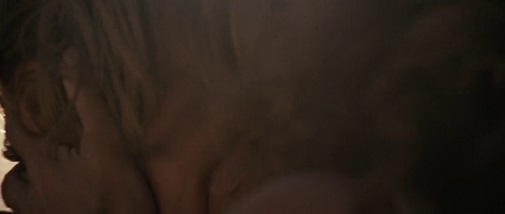
Slocumb’s presence makes little difference here; the way he runs after the car as Louise guns it is a moment that has never quite landed for me. While his investment makes sense, and his pleading to prevent the two women from coming to harm is valiant, through modern eyes it comes off as a bit nice guy-ish. Or perhaps he’s just emblematic of the kind of world these women didn’t really know they could have existed in.
Thom Noble edits this sequence so well. Each cut creates more drama than the last, such that even though it all happens so fast, it feels like an eternity that you’re watching that car soar over the Grand Canyon. The polaroid is whipped out of the back seat, their image living on the wind, and the hubcap flies off the Thunderbird, symbolic of the shackles of their domestic lives breaking off their ankles.
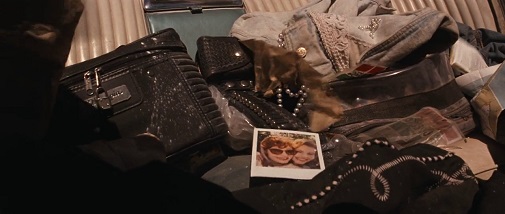
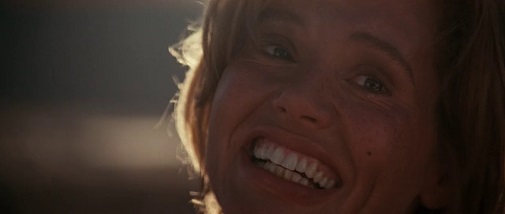
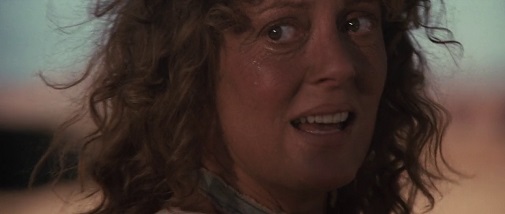
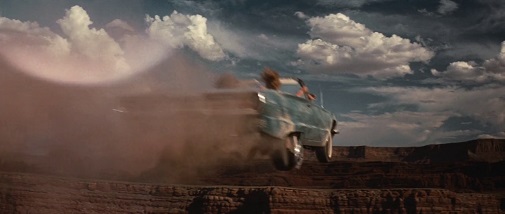
It’s a timeless image to end what remains a timely film, which looks and sounds gorgeous. It’s also a real crime that it wasn’t nominated for Costume Design, because the way their looks evolve throughout this film is unreal (kudos to Elizabeth McBride, whose lone nomination was for Driving Miss Daisy).
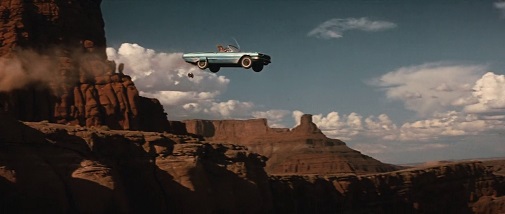
But it’s ultimately the Sarandon and Davis show, two women whose careers really have been so indelibly shaped by this movie and what it represents. Their performances are sexy, raw, vibrant, heart-rending, but they ring with such clarity, such realness. There’s so much that could be said about it, but really, there’s only one way to sum it up:
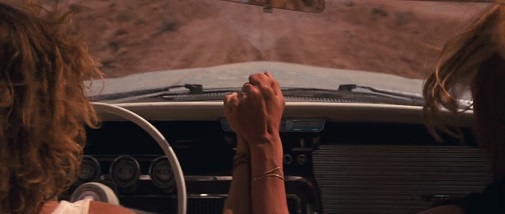



Reader Comments (18)
This was such a beautifully written series, by all of you. Gorgeous insights by all involved, and I'm not gonna lie, I welled up by the end. Bravo!
http://www.theatlantic.com/entertainment/archive/2016/05/thelma-louise-holds-up-wella-little-too-well/484121/
given her newfound disposition and freedom, it seems fairly ironic to wear a Confederate flag
These are mid-west / southern characters and they're all white. Of course they'll likely see it as a cultural byproduct of where they are.
Not that the racial implications weren’t clear at the time, but this brief scene feels a bit less funny these days than it used to.
That's because it's a dated un-PC moment that would never pass muster in a movie not helmed by Tyler Perry or Lee Daniels.
The Simpsons didn't treat Thelma and Louise like a sacred cow because they were parodying it during its era, same with the Cape Fear take off.
The queer reading of Thelma and Louise feels like wish fulfillment. I know for decades gay people had to read between the lines but I feel the sexuality of the movie is solidly heteronormative.
The kiss is Sarandon's idea and it makes all the emotional sense in the world that it does not matter how such a kiss reads to outsiders they have no one else.
@/3rtful: Yeah it's definitely dated and a little un-PC, but it's hard to find a mainstream movie from this era that's not, in modern terms. I think "Marge on the Lam" was more homage than parody in the way of "Cape Feare" (which is my favourite episode of the series), chiefly because Marge is such a terrific character that the way they reshape the story suits her so well, but also because it tempers Homer as the male presence within it as a weird, lovely combination of the Keitel, McDonald and Madsen characters. Marge really is Thelma's character at the beginning of the film in many ways.
As for the queer reading, it's always stood out to me but I wouldn't go so far as to declare it a definite presence in the narrative. Watching this section of the film again in isolation after finishing the film definitely made it stand out in their body language. But reading too far into the vague possibility of same-sex attraction in films is a national gay past time after all, especially for films around this era, and the unknowability of the kiss is definitely part of its appeal.
laurence -- and 'unknowability' is one of the great things about the movie that helps it endure. There is so much that's left for the viewer to fill in. Not just the subliminal queerness (yes queer readings are fine -- we probably need to get over binary thinking with gay/straight) but so much of their backstory being undefined. Sometime in the aughts every screenplay and every project decided backstory was what was missing from everything and proceeded to kill imagination.
I really believe its wide open spaces (not just in the geography) have helped it endure. You can put yourself inside the narrative (yes, even if you're a man ;) and it can resonate with your own particulars.
and thank you. I loved the very last bit so much.
Amanda -- thank you. I think so too. Well maybe not my part -haha- but i'm proud of the team.
Great write up,yes that scene should have secured Harvey the nomination.
Love the shot of the helicopter circling through the canyon
Watch the deleted scenes on the dvd for a different ending and lots of other worthwhile scenes,thanks to all 5 writers it was a pleasure.
A good interview with Callie Khouri by Dazed here -
http://www.dazeddigital.com/artsandculture/article/31284/1/dissecting-the-feminist-legacy-of-thelma-louise
My favourite excerpt (which touches on a few points raised over the past few days -
ON THE ‘MALE-BASHING’ HYSTERIA SURROUNDING THE FILM
“The thing that blew in my mind from being at college was, like, ‘Gee, the opportunities (as a female actor) to play prostitutes are never gonna run out!’ And I thought, ‘Why is it that?’ and I think it’s because seeing women as sexual creatures that aren’t in a submissive position does seem threatening (for a lot of people). I think that was borne out by the fact that people saw Thelma & Louise as male-bashing. At the time there was a lot of negative, uh, flap about the film being all of these things. And I was completely stunned and caught off guard by that, I’ll never forget the first time I read it. I was just like, ‘What?! What are you talking about?’ I mean, you see men blowing the bejesus out of each other in every single movie that you go to. And women are practically non-existent, except to be the girlfriend or the evil insider of violence or something like that, you know. I wasn’t seeing women represented in a way that made me want to be one. I didn’t feel compelled in any way to be writing a movie about role models. Nobody is talking to Tarantino or Sorcese about that! Nobody was asking Oliver Stone about whether he was writing role models. And actually I noticed then that John Singleton’s movie, Boyz n the Hood, received a similar kind of criticism, and so did other movies that were predominantly black. And it was like, ‘Oh, I see – women and black people have to portray role models, but everyone else can just do whatever the fuck they want.’”
Beautifully done, Laurence!!!
This is one of my favourite movies, and it's imagery is as iconic and resonant to me as any Speilberg, Star Wars, or Scorcese film. I wasn't sure how it would stand up to the scrutiny of younger TFE writers. Happily this series was as diverse and interesting as the Thelma and Louise's road trip.
Thank you to the entire team for such a perceptive, balanced and insightful review of this classic film.
Laurence - Well done for highlighting how well the cinematography and the actresses performances that bring off one of the hardest endings for any film. Scott set this up so well, it was a call back to "Bonnie and Clyde", and it always felt right that there was no turning back for Thelma and Louise.
Greatgreatgreat work, Laurence! A perfect way to end the retrospective.
This was such a great series. Everyone did such a wonderful job. I haven't seen this movie in years but, like someone else said, I started getting emotional just READING about the ending. Although I have to say, I'm not sure I see the ending as "uplifting" but I understand what you're going for. It's still pretty heartbreaking to me.
And kermit, that quote is so spot on. It's interesting that Khouri hasn't really done anything on this level since.
A friend of mine, back when this came out, was angry at the filmmakers for cutting away from the frozen shot of the car in midair to a pop song and happy faces: "Let us FEEL the enormity of what happened, even for a few more seconds!" I would tend to agree, but it's still a powerful ending to a wonderful, instant classic. All of you did a great job dissecting it, thank you.
@Nathaniel: Whenever I watch this movie I end up thinking about all the jobs they had before they wound up where they were. In some parallel dimension there's a Thelma & Louise Cinematic Universe full of rich, gorgeous stories branching off from this one.
@DJDeeJay: I wasn't sure when I was watching and writing that other people would see the ending as uplifting or not. Even though they essentially commit suicide, which is very macabre, there's such a romanticism to it conjured through the performances, the visual of the car and Zimmer's score, which is pretty perfect in this moment. I guess it's catharsis as much as it is uplift.
@Rob: I sort of feel that way too. It could just be a liiiiittle more. The fade to white feels natural but in truth it should really linger on a white screen for a while to let what happens seep in even further. The intrusion of the song and recap over the credits is a weird choice, kind of like when you finish an episode of a very serious TV show and the network pushes some insanely cheery ad over the credits.
Thank you all for the kind words, I'm glad I was able to meet the high standard set by the team in the previous four parts and do justice to one of my favourite movies.
Rob -- i actually agree with that criticism. I think the freeze-frame should have lasted a lot longer but minor quibbles are just that when the film is so HUGE in my head.
oh one more thing i forgot to add. "Somethings, like, crossed over in me... and I can't go back. I couldn't live" is to me one of the best line readings of all time. It's a monumentally soulful moment and a difficult one and Geena is perfect. Even if it wasn't for *this* movie, I'm so glad both of these actresses have Oscars.
I was an Usher at AMC Esquire in St. Louis when this came out. And, despite my job, I spend all Opening Day staying out of this theater to avoid spoilers.
And what happens at the end of the last show of the night? Some woman tells her friend, right in front of me, "I just can't believe how they just drove off the cliff like that!"
Someone almost got pushed off the Grand Canyon right there.
Still thoroughly enjoy this movie, and it's best friends on the lam. Thank you for the series!
Nathaniel...totally agree about Geena's "crossed over" line reading...also love "Let's keep going".(amongst everything else she says in the movie, because she's perfect!)
Even if it wasn't for *this* movie, I'm so glad both of these actresses have Oscars.
Despite Davis' Oscar being category fraud for The Accidental Tourist, and Sarandon's overdue Oscar is a mercy --- I agree with you.
Thank you all from me too for this wonderful series. And I too got a little weepy reading about the ending.